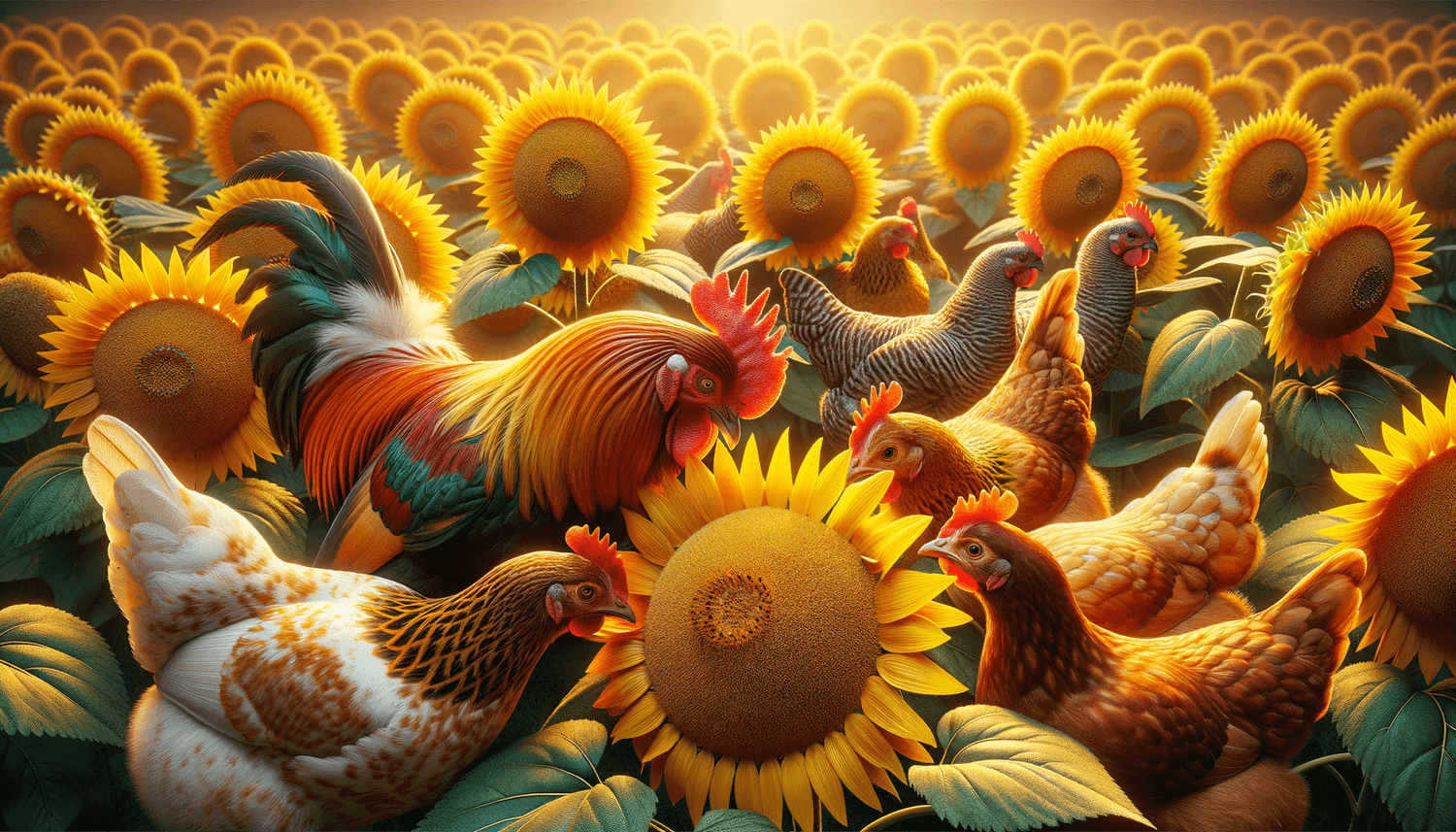Feeling sunny and ready to sprout some new knowledge? Well, you’re in luck because today we’re diving into the vibrant world of flowers and feathers! Our feathery friends have diverse tastes, that’s for sure, and as backyard chicken enthusiasts, we’re always searching for the next delectable treat to brighten their day. So, let’s find out if chickens can eat sunflowers, and if so, how to turn these delightful blossoms into nutritious and scrumptious snacks! Along the way, we’ll learn about the importance of a balanced diet, any potential risks or benefits, and how to prepare sunflowers for our clucking companions!
Can chickens eat sunflowers?
Yes, chickens can safely eat sunflowers! In fact, sunflower seeds are an excellent source of protein and other nutrients that can support your chickens’ health. However, moderation is key; sunflower seeds should only make up a small part of their diet to ensure that they are receiving a balanced, nutritional meal.
Finding balance in a chicken’s diet
Just like humans, chickens need a balanced diet to thrive and maintain optimal health. To achieve this nourishing equilibrium, it’s important to provide a mix of staple foods and occasional treats. A chicken’s diet should primarily consist of a high-quality chicken feed, which should make up around 80-90% of their total food intake. Chicken feed, when properly formulated, is specifically designed to cater to their nutritional needs, ensuring they get the right mix of proteins, vitamins, and minerals.
The remaining 10-20% of their diet can consist of treats like fruits and vegetables. Adding these delicious options can not only provide variety and excitement for your chickens, but can also supplement their diet with additional nutrients, vitamins, and minerals. Just remember that moderation is key! Offering a balanced diet is essential for the health and happiness of your feathery friends, so ensure that treats don’t take over the starring role in your chicken’s culinary adventures.
Nutritional value of sunflowers for chickens.
Feeding sunflowers to chickens can be highly beneficial, as they offer several essential nutrients that contribute to the overall health of your flock. For starters, sunflower seeds are packed with protein, which is vital for maintaining healthy feathers, building muscle, and facilitating growth in chickens. Additionally, sunflower seeds are rich in healthy fats, which can provide your birds with a beneficial energy source during colder months or periods of molting.
Aside from being an excellent source of healthy fats and protein, sunflowers bring a diverse array of vitamins and minerals to a chicken’s diet. Sunflower seeds are rich in vitamin E, which is crucial for maintaining healthy skin and feathers, as well as promoting overall immune health. They also contain essential minerals like calcium, potassium, and magnesium, which contribute to strong bones and eggshell formation. Furthermore, sunflowers offer a good dose of fiber, which can aid in digestion and promote gut health.
But it’s not only sunflower seeds that benefit chickens; the leaves and petals of sunflowers are also edible, offering a source of hydration and added enrichment. However, while sunflowers are undoubtedly beneficial, it is important to remember that moderation is essential. Merely use them as a supplement to the main diet of high-quality chicken feed and ensure that sunflowers do not become the predominant food source in your chickens’ daily routine.
Nutrition table of sunflowers for chickens.
| Information | Description |
|---|---|
| Nutritional Value | High in protein, healthy fats, vitamins (notably vitamin E), and minerals such as calcium, potassium, and magnesium. |
| Suggested Serving Size | Occasional treat, making up no more than 10-20% of their total diet. |
| Safe Feeding Practices | Offer in moderation, preferably shelled, and as a complement to high-quality chicken feed. |
| Preparation | Shell the sunflower seeds before feeding them. Leaves and petals can also be offered as a hydrating treat. |
| Potential Risks | Excessive consumption can lead to an unbalanced diet due to high fat content. |
| Hydration | Sunflower leaves and petals provide extra hydration for chickens. |
| Digestion | Sunflower seeds contain fiber, which can aid in digestion and promote gut health. |
| Seasonal Availability | Sunflowers are typically available from late summer through fall, depending on the region. |
| Other Benefits | In addition to their nutritional value, sunflower seeds can provide energy during colder or molting periods, and sunflower petals/leaves can offer enrichment and stimulation for chickens. |
Preparing sunflowers for your chickens
When offering sunflower seeds to your chickens, it’s best to shell the seeds beforehand. This makes the seeds easier to digest and prevents any potential choking hazards. You can opt to purchase pre-shelled seeds, sometimes referred to as sunflower hearts, to save time and effort. If you choose to grow your own sunflowers and want to feed your chickens the seeds directly from the sunflower heads, let them dry out first,
While the seeds are usually the main attraction, remember that the sunflower leaves and petals are also edible and can be a fun, hydrating treat for chickens. There’s no need to worry about preparing the leaves and petals – simply rinse them off and offer them to your flock as a fresh snack.
Introducing sunflowers to your chickens’ diet
As with any new food, it’s important to introduce sunflowers to your chickens’ diet gradually. Start by offering a small amount to gauge their interest and observe any potential reactions. Chickens can be somewhat apprehensive about trying new foods, but they often end up loving sunflowers once they become familiar with the taste.
A treat they’ll surely flock to
In summary, sunflowers can be a wonderful, nutritious addition to your chickens’ diet. With their high protein content and numerous vitamins and minerals, sunflowers provide an array of benefits, from better feather quality to stronger eggshells. Offering seeds, petals, and leaves as occasional treats can keep your chickens healthy and engaged all year round. Happy snacking!

















